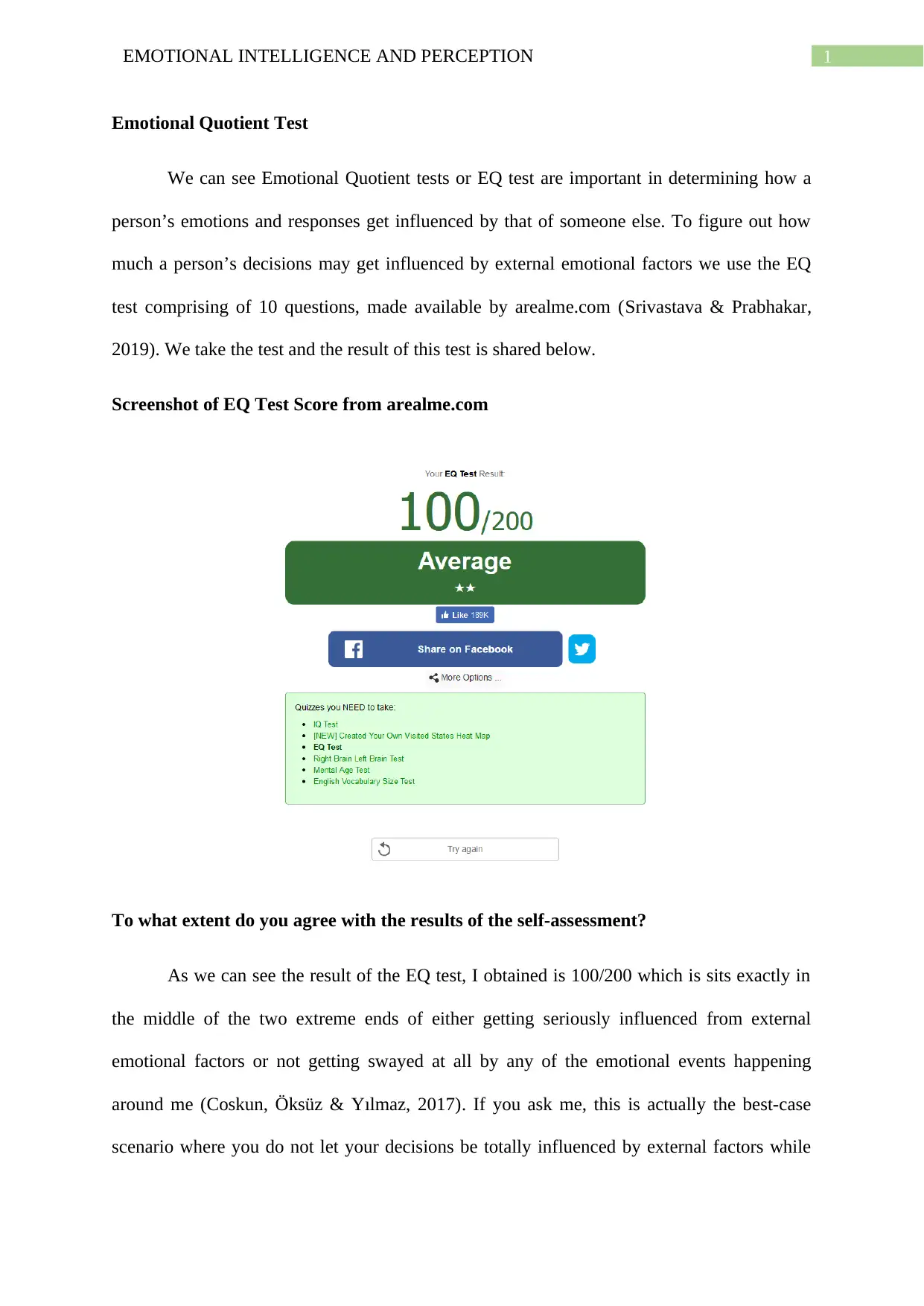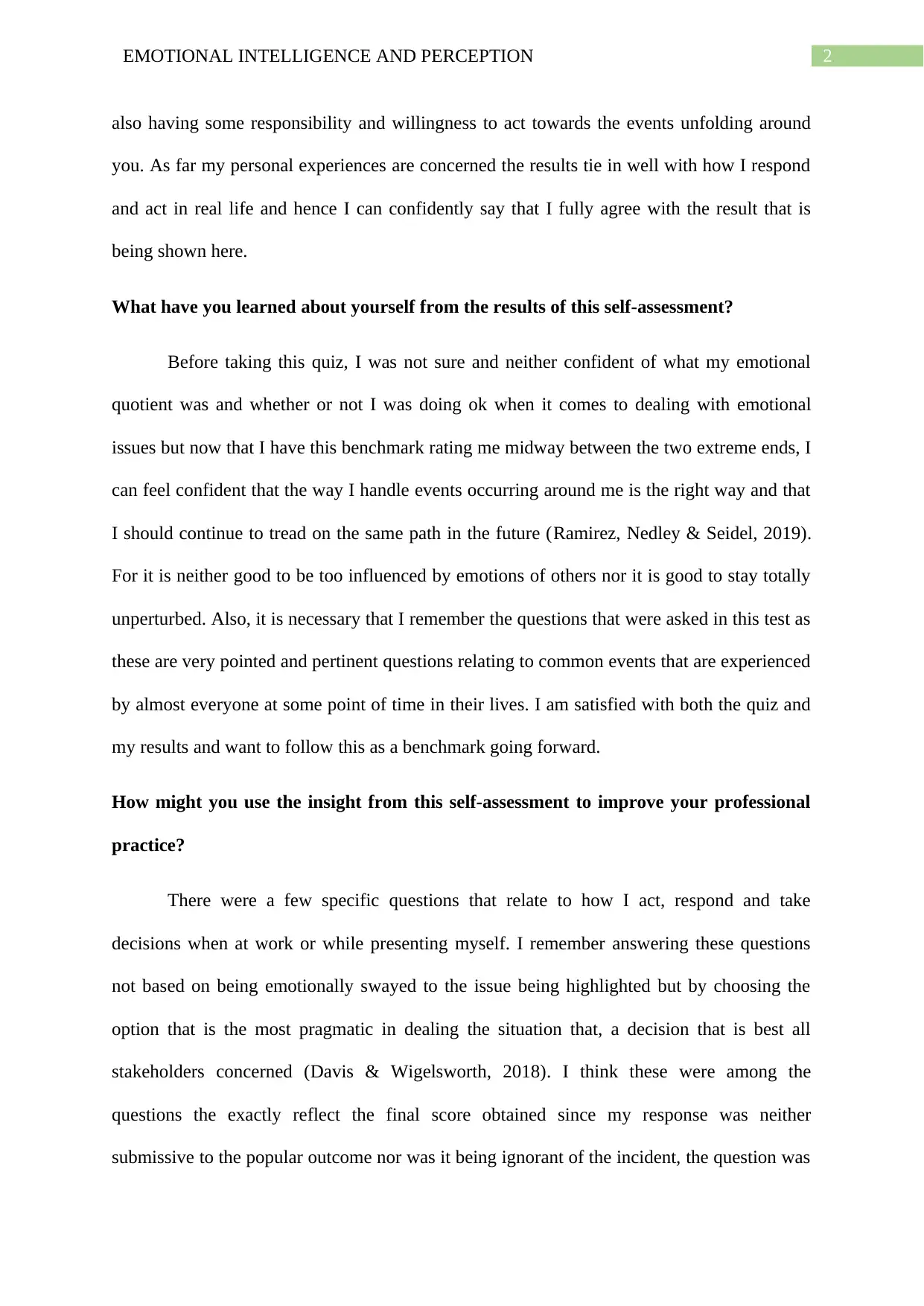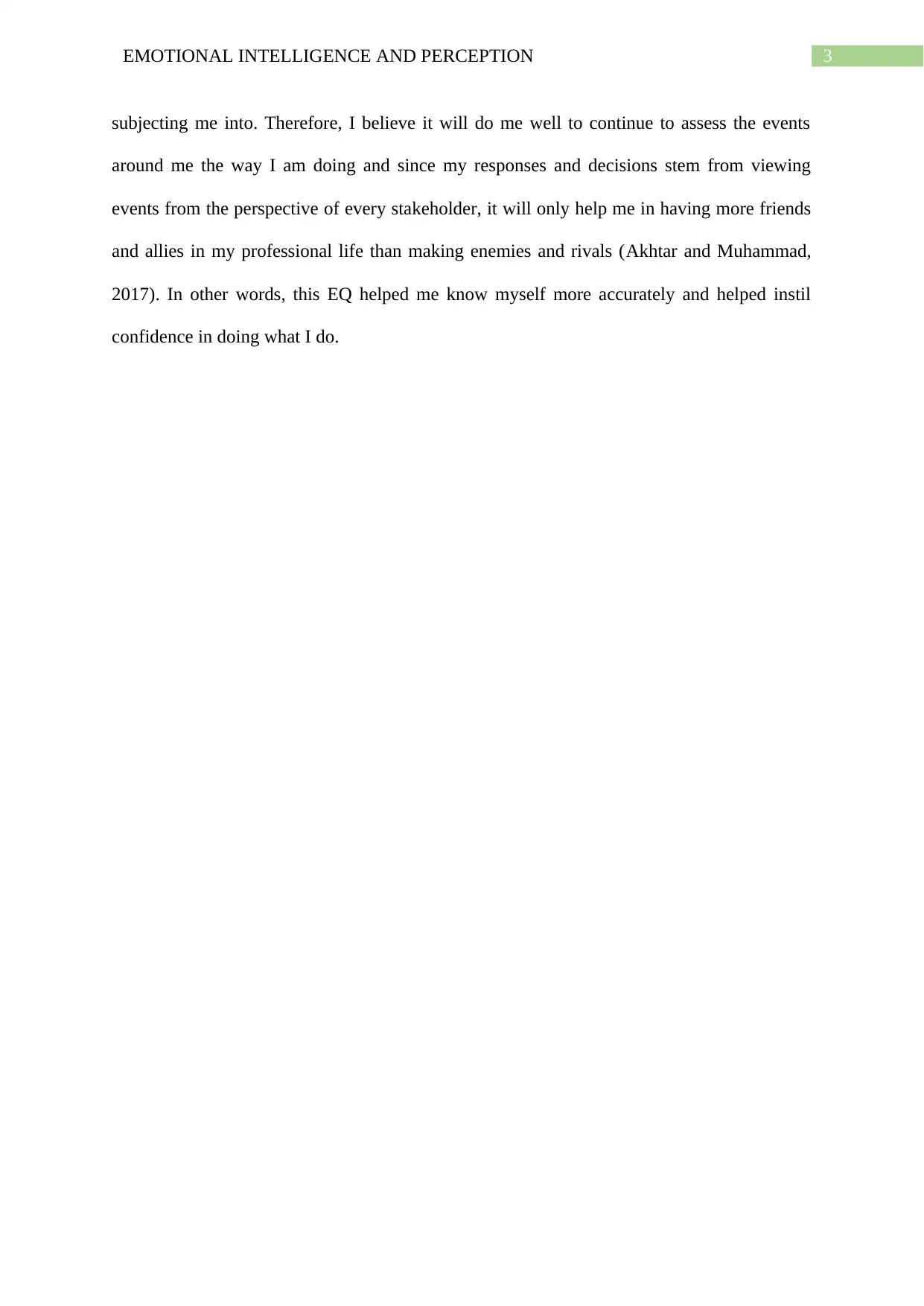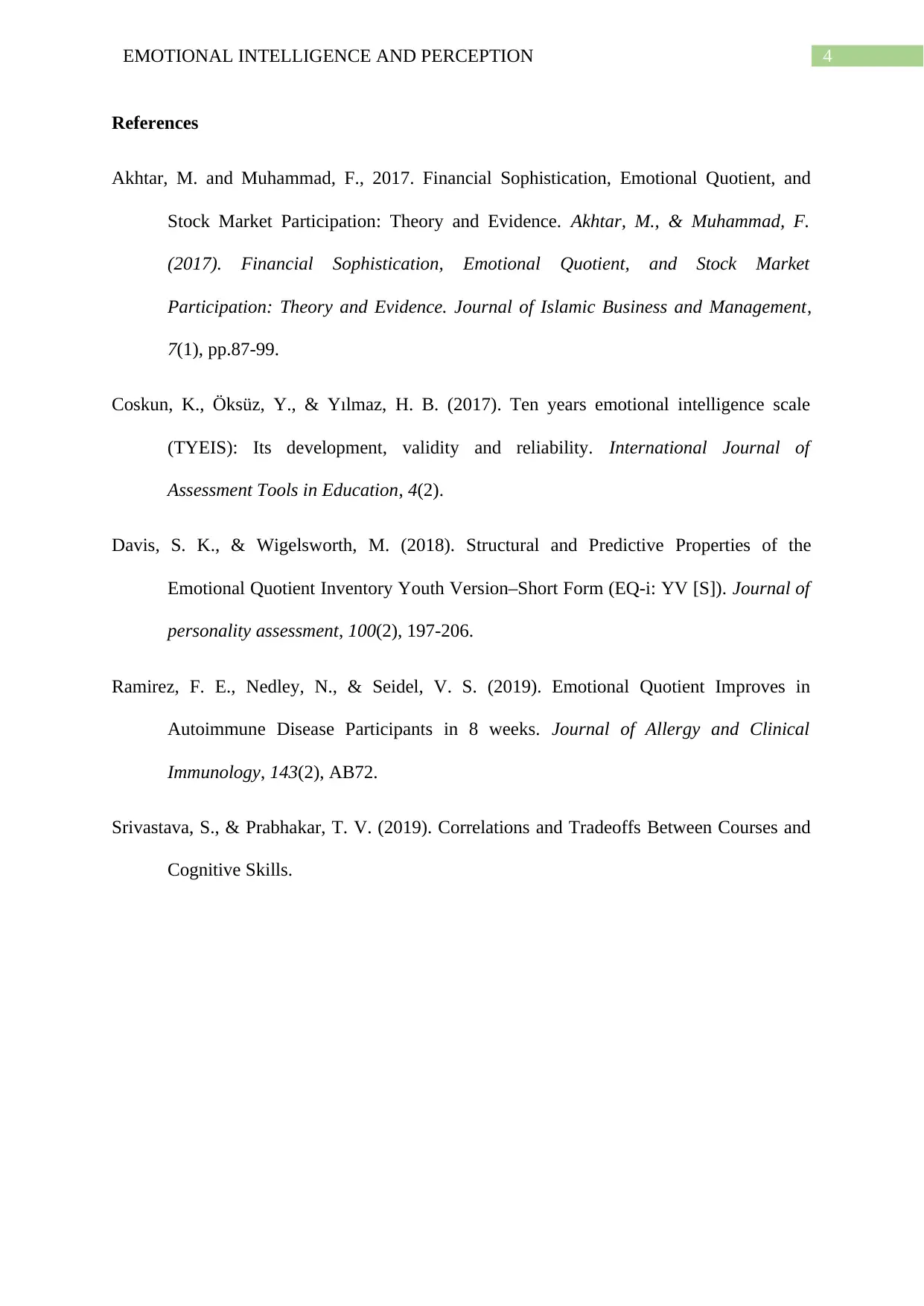Self-Assessment of Emotional Intelligence and Perception Reflection
VerifiedAdded on 2022/09/28
|5
|909
|25
Journal and Reflective Writing
AI Summary
This assignment is a reflective journal entry based on a self-assessment of emotional intelligence (EQ) using a test from arealme.com. The student's EQ score was 100/200, indicating a moderate level of influence from external emotional factors. The journal details the student's agreement with the results, highlighting how the score aligns with their real-life responses and decision-making processes. It further explores the insights gained from the assessment, emphasizing increased confidence in their emotional handling and the importance of the questions asked. The student discusses how the insights can improve their professional practice by making decisions that consider all stakeholders, fostering better relationships. The journal concludes with references to relevant academic literature supporting the concepts of emotional intelligence.

Running head: EMOTIONAL INTELLIGENCE AND PERCEPTION
Emotional Intelligence and Perception
Name of the Student
Name of the University
Author Note
Emotional Intelligence and Perception
Name of the Student
Name of the University
Author Note
Paraphrase This Document
Need a fresh take? Get an instant paraphrase of this document with our AI Paraphraser

1EMOTIONAL INTELLIGENCE AND PERCEPTION
Emotional Quotient Test
We can see Emotional Quotient tests or EQ test are important in determining how a
person’s emotions and responses get influenced by that of someone else. To figure out how
much a person’s decisions may get influenced by external emotional factors we use the EQ
test comprising of 10 questions, made available by arealme.com (Srivastava & Prabhakar,
2019). We take the test and the result of this test is shared below.
Screenshot of EQ Test Score from arealme.com
To what extent do you agree with the results of the self-assessment?
As we can see the result of the EQ test, I obtained is 100/200 which is sits exactly in
the middle of the two extreme ends of either getting seriously influenced from external
emotional factors or not getting swayed at all by any of the emotional events happening
around me (Coskun, Öksüz & Yılmaz, 2017). If you ask me, this is actually the best-case
scenario where you do not let your decisions be totally influenced by external factors while
Emotional Quotient Test
We can see Emotional Quotient tests or EQ test are important in determining how a
person’s emotions and responses get influenced by that of someone else. To figure out how
much a person’s decisions may get influenced by external emotional factors we use the EQ
test comprising of 10 questions, made available by arealme.com (Srivastava & Prabhakar,
2019). We take the test and the result of this test is shared below.
Screenshot of EQ Test Score from arealme.com
To what extent do you agree with the results of the self-assessment?
As we can see the result of the EQ test, I obtained is 100/200 which is sits exactly in
the middle of the two extreme ends of either getting seriously influenced from external
emotional factors or not getting swayed at all by any of the emotional events happening
around me (Coskun, Öksüz & Yılmaz, 2017). If you ask me, this is actually the best-case
scenario where you do not let your decisions be totally influenced by external factors while

2EMOTIONAL INTELLIGENCE AND PERCEPTION
also having some responsibility and willingness to act towards the events unfolding around
you. As far my personal experiences are concerned the results tie in well with how I respond
and act in real life and hence I can confidently say that I fully agree with the result that is
being shown here.
What have you learned about yourself from the results of this self-assessment?
Before taking this quiz, I was not sure and neither confident of what my emotional
quotient was and whether or not I was doing ok when it comes to dealing with emotional
issues but now that I have this benchmark rating me midway between the two extreme ends, I
can feel confident that the way I handle events occurring around me is the right way and that
I should continue to tread on the same path in the future (Ramirez, Nedley & Seidel, 2019).
For it is neither good to be too influenced by emotions of others nor it is good to stay totally
unperturbed. Also, it is necessary that I remember the questions that were asked in this test as
these are very pointed and pertinent questions relating to common events that are experienced
by almost everyone at some point of time in their lives. I am satisfied with both the quiz and
my results and want to follow this as a benchmark going forward.
How might you use the insight from this self-assessment to improve your professional
practice?
There were a few specific questions that relate to how I act, respond and take
decisions when at work or while presenting myself. I remember answering these questions
not based on being emotionally swayed to the issue being highlighted but by choosing the
option that is the most pragmatic in dealing the situation that, a decision that is best all
stakeholders concerned (Davis & Wigelsworth, 2018). I think these were among the
questions the exactly reflect the final score obtained since my response was neither
submissive to the popular outcome nor was it being ignorant of the incident, the question was
also having some responsibility and willingness to act towards the events unfolding around
you. As far my personal experiences are concerned the results tie in well with how I respond
and act in real life and hence I can confidently say that I fully agree with the result that is
being shown here.
What have you learned about yourself from the results of this self-assessment?
Before taking this quiz, I was not sure and neither confident of what my emotional
quotient was and whether or not I was doing ok when it comes to dealing with emotional
issues but now that I have this benchmark rating me midway between the two extreme ends, I
can feel confident that the way I handle events occurring around me is the right way and that
I should continue to tread on the same path in the future (Ramirez, Nedley & Seidel, 2019).
For it is neither good to be too influenced by emotions of others nor it is good to stay totally
unperturbed. Also, it is necessary that I remember the questions that were asked in this test as
these are very pointed and pertinent questions relating to common events that are experienced
by almost everyone at some point of time in their lives. I am satisfied with both the quiz and
my results and want to follow this as a benchmark going forward.
How might you use the insight from this self-assessment to improve your professional
practice?
There were a few specific questions that relate to how I act, respond and take
decisions when at work or while presenting myself. I remember answering these questions
not based on being emotionally swayed to the issue being highlighted but by choosing the
option that is the most pragmatic in dealing the situation that, a decision that is best all
stakeholders concerned (Davis & Wigelsworth, 2018). I think these were among the
questions the exactly reflect the final score obtained since my response was neither
submissive to the popular outcome nor was it being ignorant of the incident, the question was
⊘ This is a preview!⊘
Do you want full access?
Subscribe today to unlock all pages.

Trusted by 1+ million students worldwide

3EMOTIONAL INTELLIGENCE AND PERCEPTION
subjecting me into. Therefore, I believe it will do me well to continue to assess the events
around me the way I am doing and since my responses and decisions stem from viewing
events from the perspective of every stakeholder, it will only help me in having more friends
and allies in my professional life than making enemies and rivals (Akhtar and Muhammad,
2017). In other words, this EQ helped me know myself more accurately and helped instil
confidence in doing what I do.
subjecting me into. Therefore, I believe it will do me well to continue to assess the events
around me the way I am doing and since my responses and decisions stem from viewing
events from the perspective of every stakeholder, it will only help me in having more friends
and allies in my professional life than making enemies and rivals (Akhtar and Muhammad,
2017). In other words, this EQ helped me know myself more accurately and helped instil
confidence in doing what I do.
Paraphrase This Document
Need a fresh take? Get an instant paraphrase of this document with our AI Paraphraser

4EMOTIONAL INTELLIGENCE AND PERCEPTION
References
Akhtar, M. and Muhammad, F., 2017. Financial Sophistication, Emotional Quotient, and
Stock Market Participation: Theory and Evidence. Akhtar, M., & Muhammad, F.
(2017). Financial Sophistication, Emotional Quotient, and Stock Market
Participation: Theory and Evidence. Journal of Islamic Business and Management,
7(1), pp.87-99.
Coskun, K., Öksüz, Y., & Yılmaz, H. B. (2017). Ten years emotional intelligence scale
(TYEIS): Its development, validity and reliability. International Journal of
Assessment Tools in Education, 4(2).
Davis, S. K., & Wigelsworth, M. (2018). Structural and Predictive Properties of the
Emotional Quotient Inventory Youth Version–Short Form (EQ-i: YV [S]). Journal of
personality assessment, 100(2), 197-206.
Ramirez, F. E., Nedley, N., & Seidel, V. S. (2019). Emotional Quotient Improves in
Autoimmune Disease Participants in 8 weeks. Journal of Allergy and Clinical
Immunology, 143(2), AB72.
Srivastava, S., & Prabhakar, T. V. (2019). Correlations and Tradeoffs Between Courses and
Cognitive Skills.
References
Akhtar, M. and Muhammad, F., 2017. Financial Sophistication, Emotional Quotient, and
Stock Market Participation: Theory and Evidence. Akhtar, M., & Muhammad, F.
(2017). Financial Sophistication, Emotional Quotient, and Stock Market
Participation: Theory and Evidence. Journal of Islamic Business and Management,
7(1), pp.87-99.
Coskun, K., Öksüz, Y., & Yılmaz, H. B. (2017). Ten years emotional intelligence scale
(TYEIS): Its development, validity and reliability. International Journal of
Assessment Tools in Education, 4(2).
Davis, S. K., & Wigelsworth, M. (2018). Structural and Predictive Properties of the
Emotional Quotient Inventory Youth Version–Short Form (EQ-i: YV [S]). Journal of
personality assessment, 100(2), 197-206.
Ramirez, F. E., Nedley, N., & Seidel, V. S. (2019). Emotional Quotient Improves in
Autoimmune Disease Participants in 8 weeks. Journal of Allergy and Clinical
Immunology, 143(2), AB72.
Srivastava, S., & Prabhakar, T. V. (2019). Correlations and Tradeoffs Between Courses and
Cognitive Skills.
1 out of 5
Related Documents
Your All-in-One AI-Powered Toolkit for Academic Success.
+13062052269
info@desklib.com
Available 24*7 on WhatsApp / Email
![[object Object]](/_next/static/media/star-bottom.7253800d.svg)
Unlock your academic potential
Copyright © 2020–2026 A2Z Services. All Rights Reserved. Developed and managed by ZUCOL.




